🔰A New Liver, A New Life – But with Long-term Medication
A liver transplant is not just a surgery—it’s a lifelong journey of care, vigilance, and partnership with your medical team. One of the most important pillars of success post-transplant is understanding and adhering to your medication regimen. Patients often receive multiple medicines before and after surgery, some of which continue for life.
The KYM concept was suggested by the renowned liver transplant surgeon, Dr. Puneet Dargan, to help patients navigate their complex medication regimens.
This blog is written with one goal in mind—to empower patients and caregivers to take control of their treatment. Medical language can be confusing, so this KYM (Know Your Medicine) series breaks it all down in everyday language.
🎙️Podcast: KYM
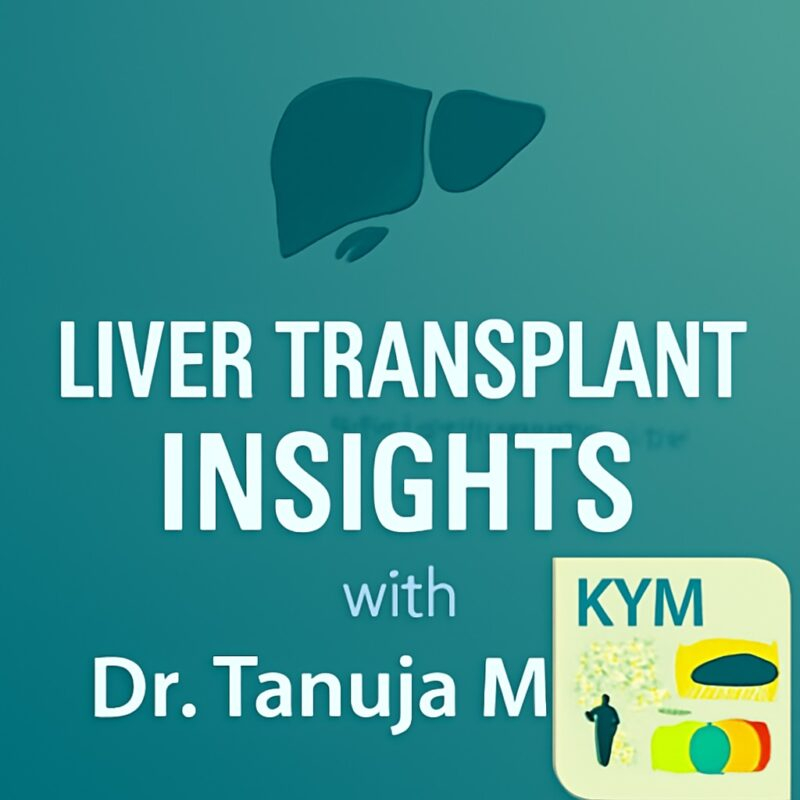
🎧 Listen to the Podcast:
Liver Transplant Insights by Dr. Tanuja Mallik
The medicines listed in this article fall into various groups, including antivirals, antibiotics, immunosuppressants, anticoagulants, and more. For example, antiviral medications like Tenofovir (Tenohep) and anticoagulants like Warfarin and Apixaban are essential for helping to prevent infections and managing blood clotting risks post-transplant.
This list only includes oral and outpatient (OPD) medications that a liver transplant patient is expected to take at home, not IV medicines given in hospitals. These are medications patients often take for months or years, sometimes for the rest of their lives.
You will learn:
- The exact name of each medicine—both generic and common brand names
- The specific role of each medicine in liver disease and transplant
- Common side effects to watch for
- Drug interactions that could be dangerous
- And most importantly, when to talk to your doctorThe ultimate goal of this article is simple: empower you with the knowledge you need to manage your health confidently. By understanding the medications you’re taking, their purposes, and potential side effects, you are putting yourself in control of your recovery journey.
💡 “When you Know Your Medicine, you own your recovery.”
Disclaimer :
Please note that the brand names mentioned in this guide are not for promotional purposes but are included solely for the convenience of patients and caregivers in identifying their medications. Always consult your healthcare provider for recommendations on medications specific to your treatment plan.
🔵 Know Your Medicine – Pre-Transplant Medicines
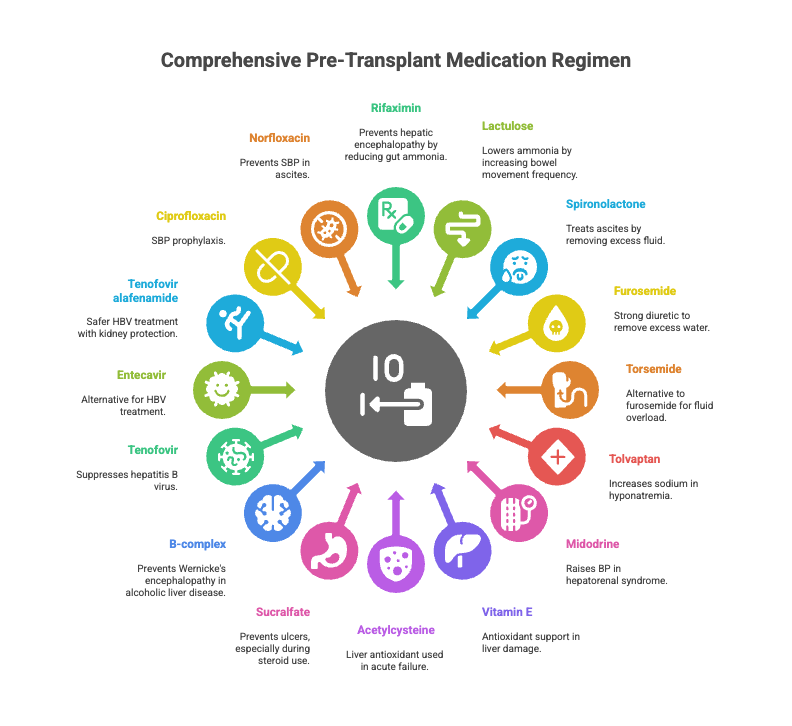
1. Rifaximin
Brand name: Rifagut
Role: Prevents hepatic encephalopathy by reducing gut ammonia.
Side Effects: Gas, nausea.
Interactions: May reduce effectiveness of warfarin.
2. Lactulose
Brand name: Looz, Duphalac
Role: Lowers ammonia by increasing bowel movement frequency.
Side Effects: Diarrhoea, bloating.
Interactions: Avoid with other laxatives.3. Spironolactone
Brand name: Aldactone
Role: Treats ascites by removing excess fluid.
Side Effects: High potassium, breast changes in men.
Interactions: Avoid with ACE inhibitors.4. Furosemide
Brand name: Lasix
Role: Strong diuretic to remove excess water.
Side Effects: Dehydration, low potassium.
Interactions: NSAIDs may reduce effect and potentiate kidney dysfunction.5. Torsemide
Brand name: Dytor
Role: Alternative to furosemide for fluid overload.
Side Effects: Similar to furosemide.
Interactions: May increase digoxin toxicity.6. Tolvaptan
Brand name: Tolvat
Role: Increases sodium in hyponatremia.
Side Effects: Thirst, liver toxicity.
Interactions: Avoid with CYP3A4 inhibitors.7. Midodrine
Brand name: Gutron
Role: Raises BP in hepatorenal syndrome.
Side Effects: Tingling, high BP.
Interactions: Avoid with MAOIs.8. Vitamin E
Brand name: Evion
Role: Antioxidant support in liver damage, NAFLD.
Side Effects: High doses may cause bleeding.
Interactions: Warfarin increases bleeding risk.9. Acetylcysteine
Brand name: Mucomix
Role: Liver antioxidant, used in acute failure.
Side Effects: Vomiting, rash.
Interactions: May interfere with antibiotics.10. Sucralfate
Brand name: Sucral
Role: Prevents ulcers, especially during steroid use.
Side Effects: Constipation.
Interactions: Affects absorption of many drugs.11. B-complex with higher Dose of Thiamine + Magnesium
Brand name: Alcomax
Role: Prevents Wernicke's encephalopathy in alcoholic liver disease.
Side Effects: Rare nausea.
Interactions: Minimal.12. Tenofovir
Brand name: Tenohep, Ricovir
Role: Suppresses hepatitis B virus.
Side Effects: Kidney damage, bone loss.
Interactions: Avoid nephrotoxic drugs.13. Entecavir
Brand name: Entavir, X-Vir
Role: Alternative for HBV treatment.
Side Effects: Headache, nausea.
Interactions: Avoid with other antivirals.14. Tenofovir alafenamide
Brand name: TAF
Role: Safer HBV treatment and with kidney protection.
Side Effects: GI upset.
Interactions: Rifampin, anticonvulsants.15. Ciprofloxacin
Brand name: Ciplox
Role: SBP prophylaxis.
Side Effects: Tendonitis, GI upset.
Interactions: Antacids, theophylline.16. Norfloxacin
Brand name: Norflox
Role: Prevents SBP in ascites.
Side Effects: Dizziness, rash.
Interactions: Similar to ciprofloxacin.🟢 Know Your Medicine – Post-Liver-Transplant Medicines
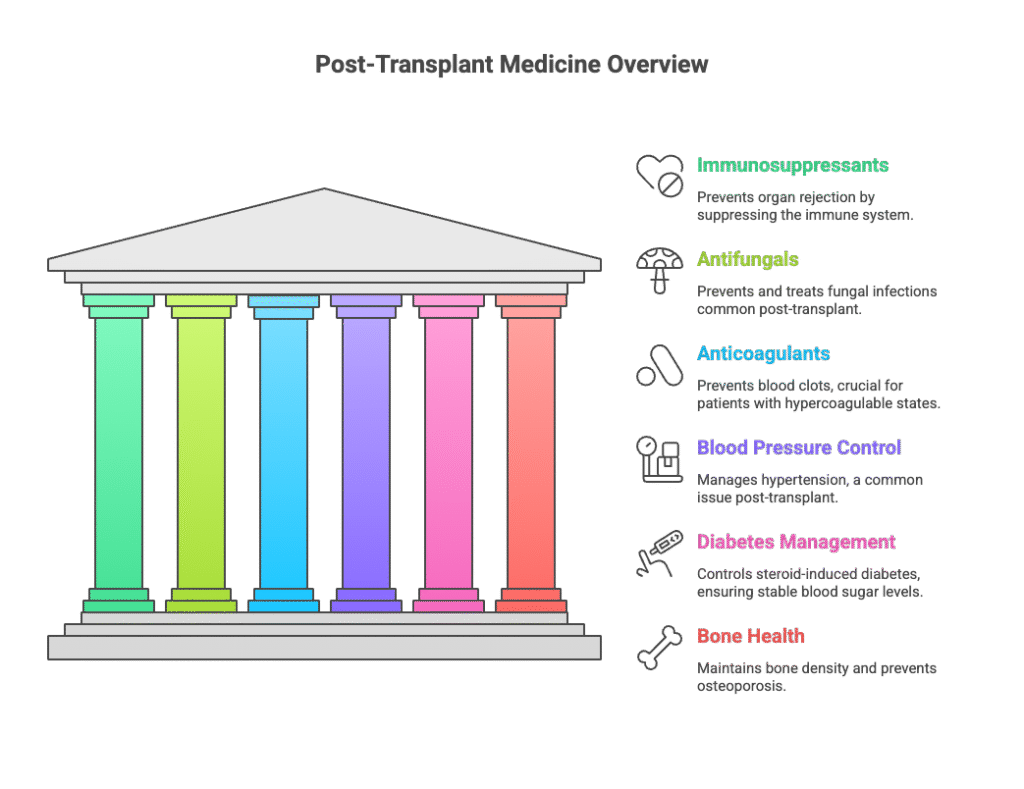
17. Tacrolimus
Brand name: Prograf, Pangraf, Advagraf
Role: Prevents rejection by suppressing immunity.
Side Effects: Kidney issues, tremors.
Interactions: Avoid grapefruit juice, many drugs increase levels.18. Mycophenolate mofetil
Brand name: Cellcept, Mycept
Role: Reduces immune response.
Side Effects: Diarrhea, low WBC count.
Interactions: Antacids reduce absorption.19. Everolimus
Brand name: Certican
Role: Used for renal-sparing immunosuppression.
Side Effects: Mouth ulcers, delayed healing.
Interactions: Tacrolimus dose may need adjustment.20. Valganciclovir
Brand name: Valcyte
Role: Prevents CMV infection.
Side Effects: Low blood counts.
Interactions: Avoid other myelosuppressive drugs.21. Sulfamethoxazole/Trimethoprim
Brand name: Septran, Bactrim
Role: Prevents Pneumocystis jiroveci pneumonia.
Side Effects: Rash, low platelets.
Interactions: Increased INR with warfarin.22. Fluconazole
Brand name: Flucos
Role: Prevents fungal infections.
Side Effects: Liver enzyme elevation.
Interactions: Increases tacrolimus level.23. Posaconazole
Brand name: Posoxil, Posanat
Role: Strong antifungal for high-risk patients.
Side Effects: Nausea, liver toxicity.
Interactions: Raises tacrolimus/everolimus.24. Isavuconazole
Brand name: Cresemba, Isoconazole
Role: Treats invasive fungal infections.
Side Effects: Diarrhoea, low potassium.
Interactions: Dose adjustments for tacrolimus.25. Clotrimazole
Brand: Candid mouth paint)
Role: Treats oral thrush.
Side Effects: Mouth irritation.
Interactions: Minimal.26. Aspirin
Brand Name: Ecosprin (Low-dose)
Role: Prevents clot formation in Hepatic artery.
Side Effects: Gastric irritation.
Interactions: Increased bleeding with anticoagulants.27. Enoxaparin
Brand name: Clexane
Role: Prevents blood clots post-surgery.
Side Effects: Bleeding, low platelets.
Interactions: Avoid NSAIDs28. Fondaparinux
Brand name: Arixtra
Role: Used as an anticoagulant in liver transplant patients, with a hypercoagulable state, to reduce the risk of blood clot formation.
Side Effects: Bleeding, injection site reactions, and elevated liver enzymes.
Interactions: Avoid with other anticoagulants and NSAIDs. Use caution with drugs that increase bleeding risk.29. Rivaroxaban
Brand name: Xarelto
Role: Used as an anticoagulant in liver transplant patients, with a hypercoagulable state, to reduce the risk of blood clot formation.
Side Effects: Bleeding, dizziness, fatigue, liver enzyme elevation.
Interactions: Avoid with strong CYP3A4 inhibitors, other anticoagulants, and NSAIDs.30. Apixaban
Brand: Eliquis
Role: Used as an anticoagulant in liver transplant patients, with a hypercoagulable state, to reduce the risk of blood clot formation.
Side Effects: Bleeding, bruising, nausea, and elevated liver enzymes.
Interactions: Avoid with strong CYP3A4 inhibitors or other blood thinners. Caution with NSAIDs.31. Warfarin
Brand name: Warfarin
Role: Long-used anticoagulant, prescribed to prevent blood clots in liver transplant patients, with a hypercoagulable state, to reduce the risk of blood clot formation.
Side Effects: Bleeding, bruising, hair loss, and liver enzyme elevation. Regular blood tests (INR) are required.
Interactions: A wide range of interactions with other medications, including antibiotics, antifungals, and NSAIDs. Consistent intake of Vitamin K-containing foods should be monitored.
32. Amlodipine
Brand name: Amlopres
Role: Manages high BP post-transplant.
Side Effects: Swelling, headache.
Interactions: Can increase tacrolimus.33. Metoprolol
Brand name: Betaloc, Metolar
Role: Controls BP and heart rate.
Side Effects: Fatigue, slow heart rate.
Interactions: Additive with other BP meds.34. Insulin
Various brands
Role: Manages steroid-induced diabetes.
Side Effects: Low sugar.
Interactions: Monitor with other sugar-lowering drugs.35. Calcium
Brand name: Shelcal
Role: Bone health.
Side Effects: Constipation.
Interactions: Reduces absorption of thyroid meds.Patient Survival Toolkit: Key Tools for Your Post-Transplant Journey
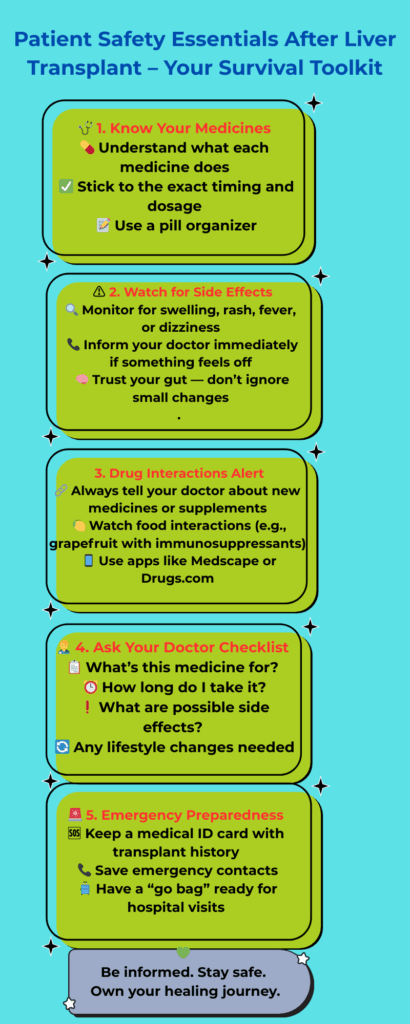
After your liver transplant, new life begins with the responsibility of protecting your second chance. Staying safe isn’t just about avoiding infection or taking medicine. It’s about owning your healing journey, one decision at a time.
Let’s walk through what that looks like in real life…
1️⃣. It Starts With the Medicine
Every morning and evening, your new liver depends on your commitment.
You sit with your pill organiser, lined up neatly like a lifeline. Each medicine plays a role — one keeps your immune system quiet, another protects your stomach, yet another ensures your body chemistry stays balanced.
You don’t just swallow pills — you understand them.
What each one does.
Why do you need them?
And above all, you never miss a dose — not even by an hour.
2️⃣ Listening to Your Body
Some days, you feel a little different — maybe there’s a bit of swelling in your feet, a rash on your arm, or a low-grade fever.
You’ve learned not to ignore these signs.
Your body speaks before trouble begins.
So, you watch for side effects like a guardian alert to changes, and unafraid to call your doctor and say,
“Something feels off.”
That one phone call? It could prevent a crisis.
3️⃣ New Medicines? Pause and Ask.
At some point, a well-meaning friend suggests a herbal tea, or a local doctor prescribes a new tablet for acidity.
But you’ve learned the golden rule: no new medicine or supplement without checking first.
You inform your transplant team — every time.
Because even the most harmless tablet can interact with your transplant medicines in dangerous ways.
4️⃣ The Power of Asking Questions
You’ve learned to ask, not out of fear, but from a place of confidence.
Every time you’re handed a new prescription, you ask:
- “What is this medicine for?”
- “How long do I need to take it?”
- “What side effects should I watch out for?”
- “Will this change how I eat, move, or live?”
This checklist isn’t just paperwork.
It’s how you take control of your safety.
5️⃣ Prepared for Emergencies
You keep a medical ID card in your wallet.
Your phone is saved with emergency numbers.
A small hospital bag is packed and ready — just in case.
Because emergencies don’t wait.
But you’re ready, and that changes everything.
💡 In the End…
Healing after liver transplant isn’t passive — it’s active, empowered, and informed.
You learn.
You ask.
You listen.
You prepare.
Every small step you take is a step towards protecting your new life.
🧡 Stay informed. Stay safe. Own your healing journey.
Side Effect Cheat Sheet
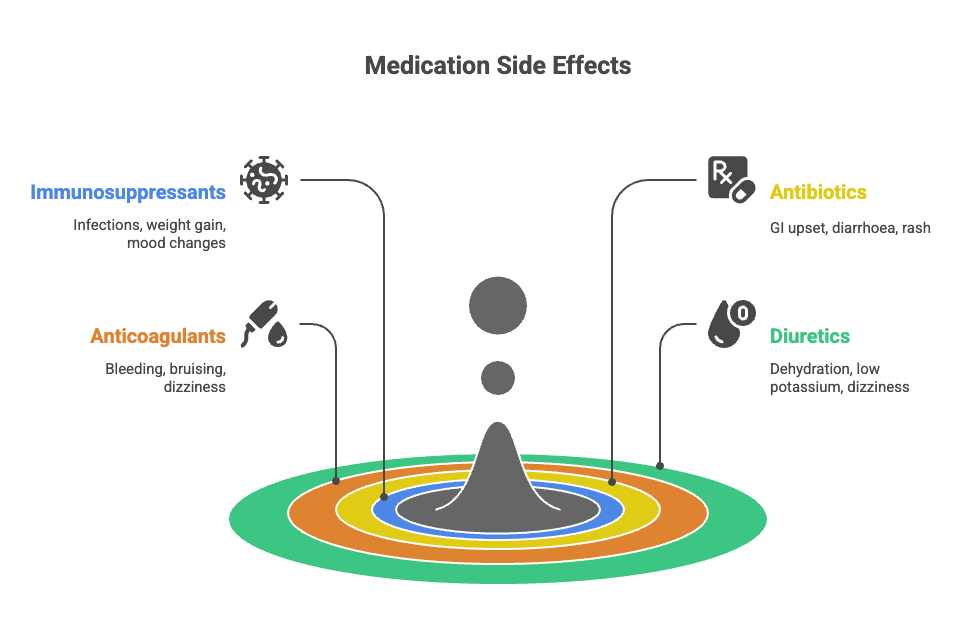
- Understanding the potential side effects of your medications helps you stay alert and seek timely medical advice. Here’s a quick reference for common side effects:
- Immunosuppressants: Risk of infections, weight gain, mood changes
- Antibiotics: GI upset, diarrhoea, rash
- Anticoagulants: Risk of bleeding, bruising, and dizziness
- Diuretics: Dehydration, low potassium, dizziness
Drug Interaction Alert
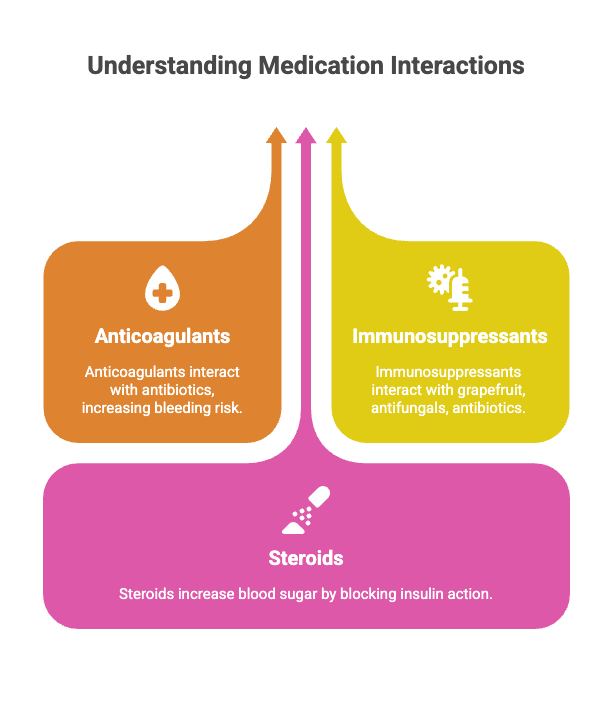
- Certain medications may interact with each other, altering their effects or causing harmful reactions. Here are some common interactions:
- Anticoagulants (e.g., Warfarin, Apixaban) can interact with antibiotics and antifungals, increasing the risk of bleeding.
- Immunosuppressants like Tacrolimus can interact with grapefruit, antifungals, and certain antibiotics.
- Steroids (e.g., Prednisolone) can increase blood sugar levels, especially by blocking the action of insulin.
Tip: Always inform your doctor about any new medications, including over-the-counter drugs and supplements.
Questions to Ask Your Doctor
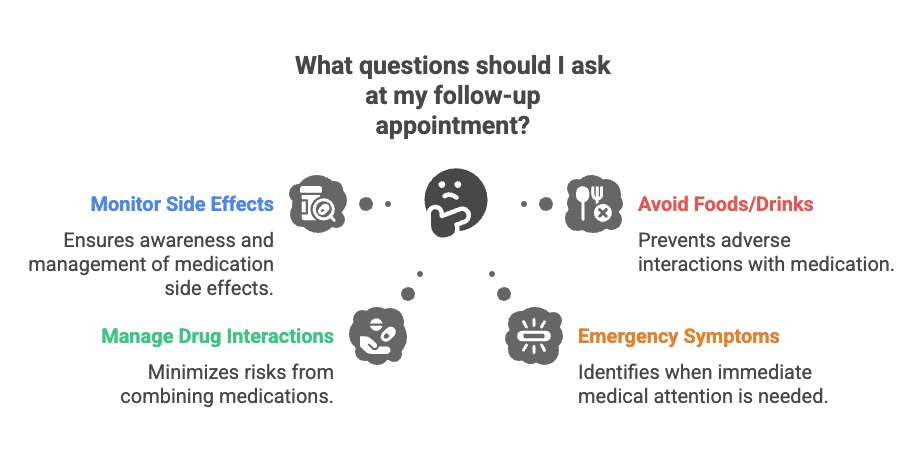
- When you’re at a follow-up appointment, don’t hesitate to ask these essential questions to ensure you’re on the right track:
- “How do I monitor for side effects of my medication?”
- “Are there any foods, drinks, or activities I should avoid while on these medications?”
- “How can I manage any possible drug interactions I might face?”
- “What signs or symptoms should prompt me to call you or go to the emergency room?”
Tip: Keeping a medication journal with the answers to these questions can help you stay informed and organised.
💬 Conclusion:
Your Health, Your Medicine – Take Charge
This Know Your Medicine blog isn’t just about listing medications—it’s about empowering liver transplant patients and caregivers to take charge of their health. Understanding your medicines ensures you’re equipped to make informed decisions about your treatment. When you Know Your Medicine, you can actively monitor side effects, identify potential drug interactions, and communicate more effectively with your healthcare team.
By having this Know Your Medicine (KYM) information at your fingertips, you reduce the risk of complications, prevent unexpected situations, and feel more confident in your recovery journey. Knowledge truly is power when it comes to liver transplant success.
When patients and caregivers understand their medicines, they become active partners in recovery. It helps prevent silent complications, supports early detection of side effects, and prompts timely reporting to your doctor.
💡 "Every pill has a purpose. When you know it, you own it."If you’re unsure about any medicine you’re taking, open this KYM guide, match the name from your strip, and take a moment to understand it. Then, talk to your transplant team.
Because informed patients recover better and safer.
Frequently Asked Questions
Are there any medicines I should avoid after a liver transplant?
Yes, certain over-the-counter medications or herbal supplements may interact negatively with your transplant medications. Always discuss any new medications with your doctor before taking them.
Can I take painkillers after my liver transplant?
Some painkillers, especially non-steroidal anti-inflammatory drugs (NSAIDs) like ibuprofen, may affect your liver function. Always ask your doctor for recommendations on safe pain relief options.
What should I do if I miss a dose of my medication?
Missing a dose of your medication can interfere with your transplant recovery. If you miss a dose, contact your doctor for guidance. Do not double up on your medication to make up for a missed dose unless instructed by your healthcare provider.
Why is it important to know my medications after a liver transplant?
Understanding your medications is crucial for ensuring a smooth recovery and preventing complications. Many medications, especially immunosuppressants, need to be taken consistently and monitored for side effects or drug interactions.
How do I know when I should contact my doctor about side effects?
If you experience any unusual symptoms like unexplained fatigue, swelling, dizziness, or bleeding, it’s important to notify your doctor. Some side effects can indicate an issue that needs medical attention. Always ask your doctor about the symptoms you should watch for.
📘 More Help for Your Liver Health Journey
🆓 Free eBooks by Dr. Tanuja Mallik:
- Know Your Medicine – Understand key post-transplant medications
- Best Foods for Liver Health – What to eat (and avoid) for optimal liver care
💬 Got a liver issue or recovering from transplant?
Book a 1-on-1 Online Consultation for personalised recovery & guidance.
🔗 Access all resources here: linktr.ee/drtanujamallik
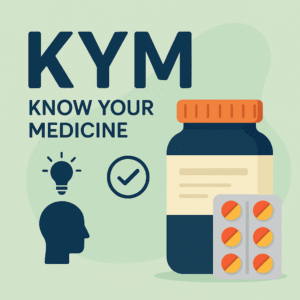
Dr. Tanuja Mallik’s “Know Your Medicine – Post Liver Transplant” is a well-crafted, highly relevant, and patient-centered guide that fills a critical knowledge gap for post-transplant patients and caregivers. Drawing from her deep experience in transplant anesthesiology and perioperative care, Dr. Mallik simplifies complex pharmacological regimens into understandable, actionable insights.
The guide succeeds in demystifying immunosuppressants, antimicrobials, and supportive therapies typically prescribed after liver transplantation. It not only explains the role and timing of medications like tacrolimus, mycophenolate mofetil, and steroids, but also highlights drug interactions, common side effects, and red-flag symptoms that require urgent attention.
What sets this work apart is its clear structure, use of layman’s language without diluting accuracy, and its emphasis on adherence and self-monitoring. The inclusion of practical tips—like how to take medicines with food, managing missed doses, and recognizing early signs of graft rejection or infection—empowers patients to take ownership of their health.
For healthcare professionals, this resource is equally valuable. It can serve as a reference tool during patient education sessions and discharge planning.
In summary, Dr. Mallik’s work is an essential read for post-liver transplant patients, caregivers, and even young clinicians entering the field of transplant medicine. It bridges the gap between complex medical prescriptions and real-life patient understanding—making it a commendable contribution to post-transplant care.
Rating: ★★★★★ (5/5)
Recommended for: Liver transplant patients, caregivers, critical care nurses, residents, and fellows in hepatology or transplant units.
Thank you so much for your kind words! I’m truly grateful for your support and encouragement. With your permission, I’d love to feature your words along with your name, designation, and picture as a testimonial on my website. It will inspire others and help build credibility for those seeking reliable anesthesia and transplant care resources.
Please let me know if you’re okay with this.
Warm regards,
Dr. Tanuja Mallik